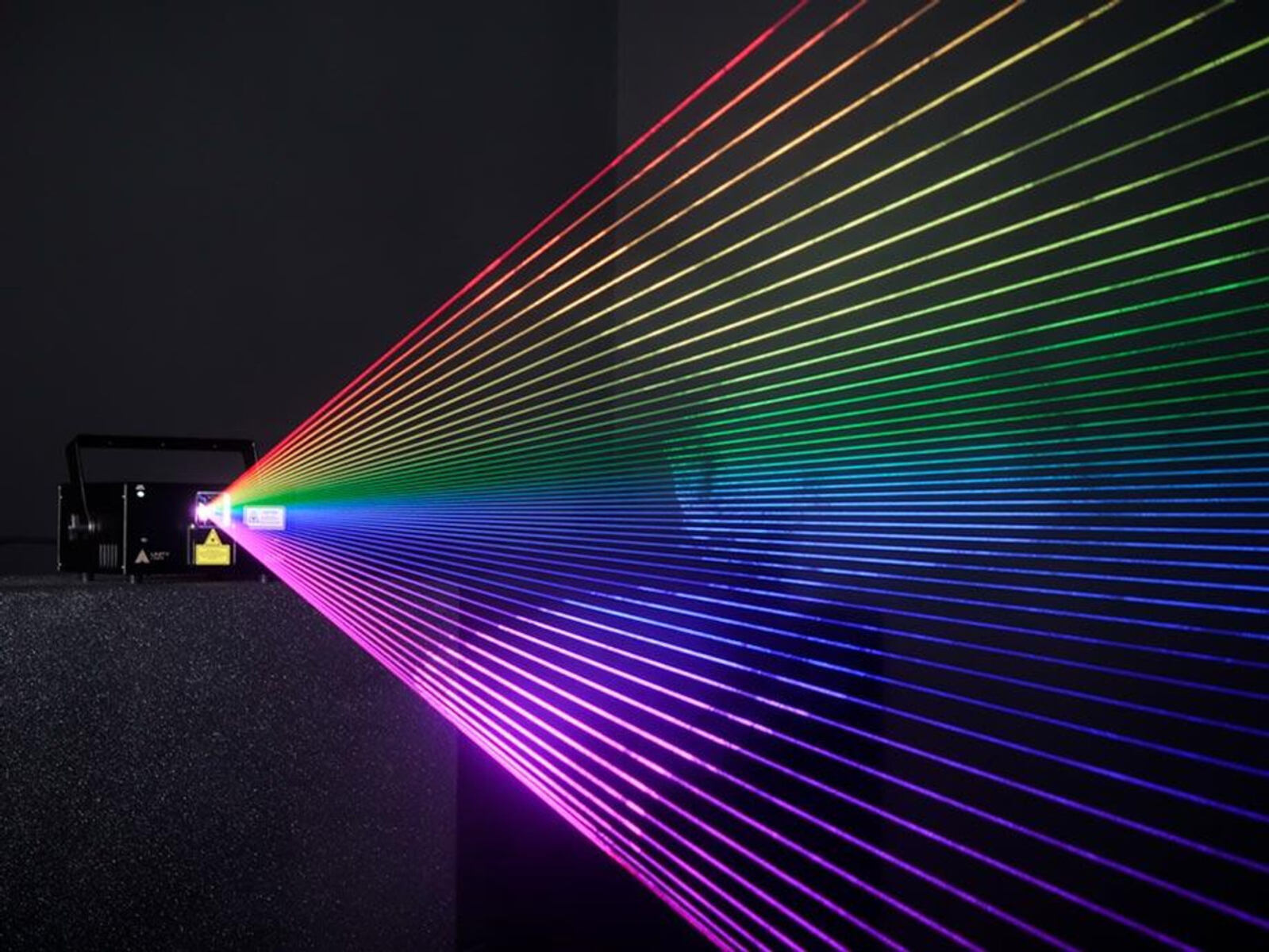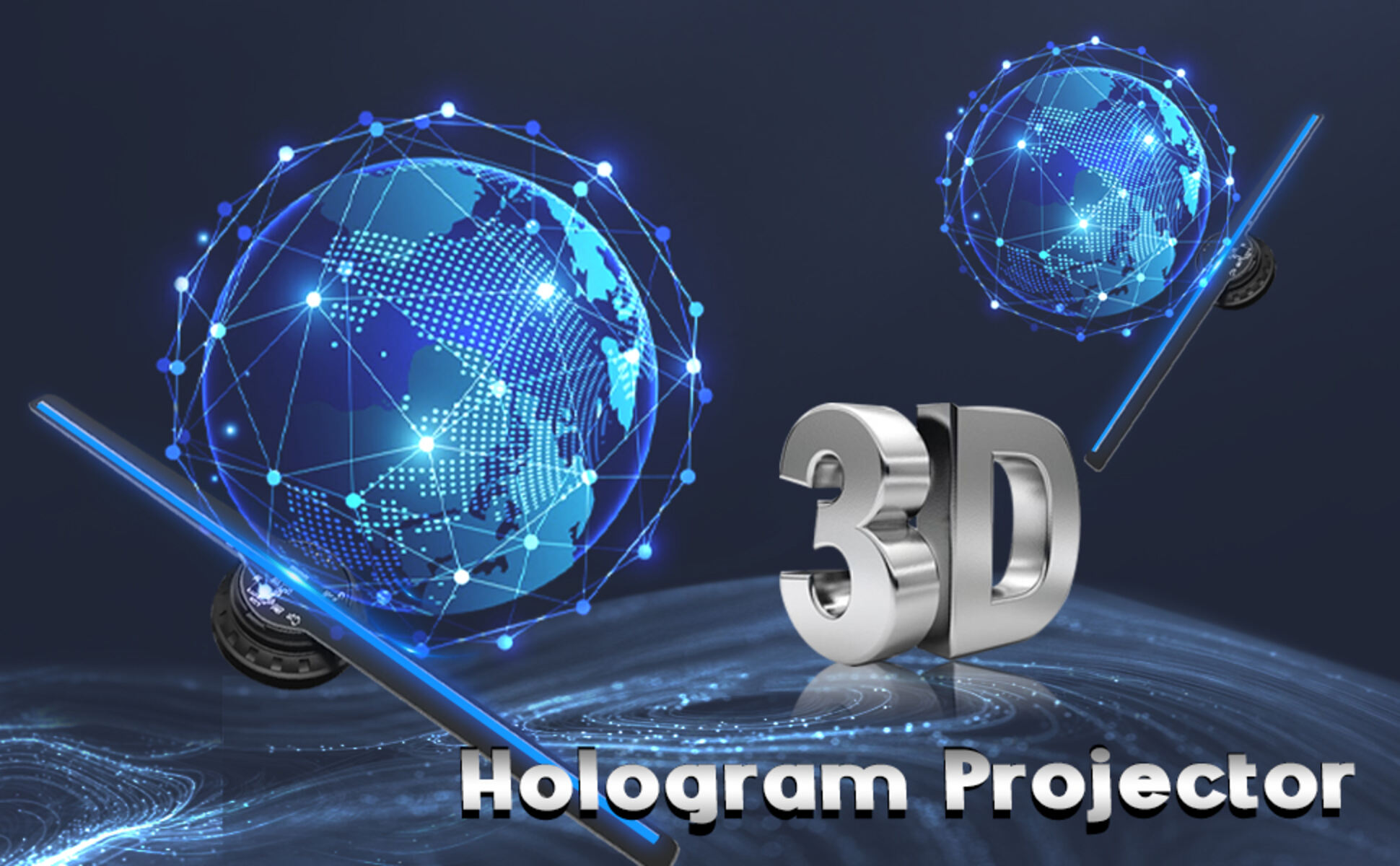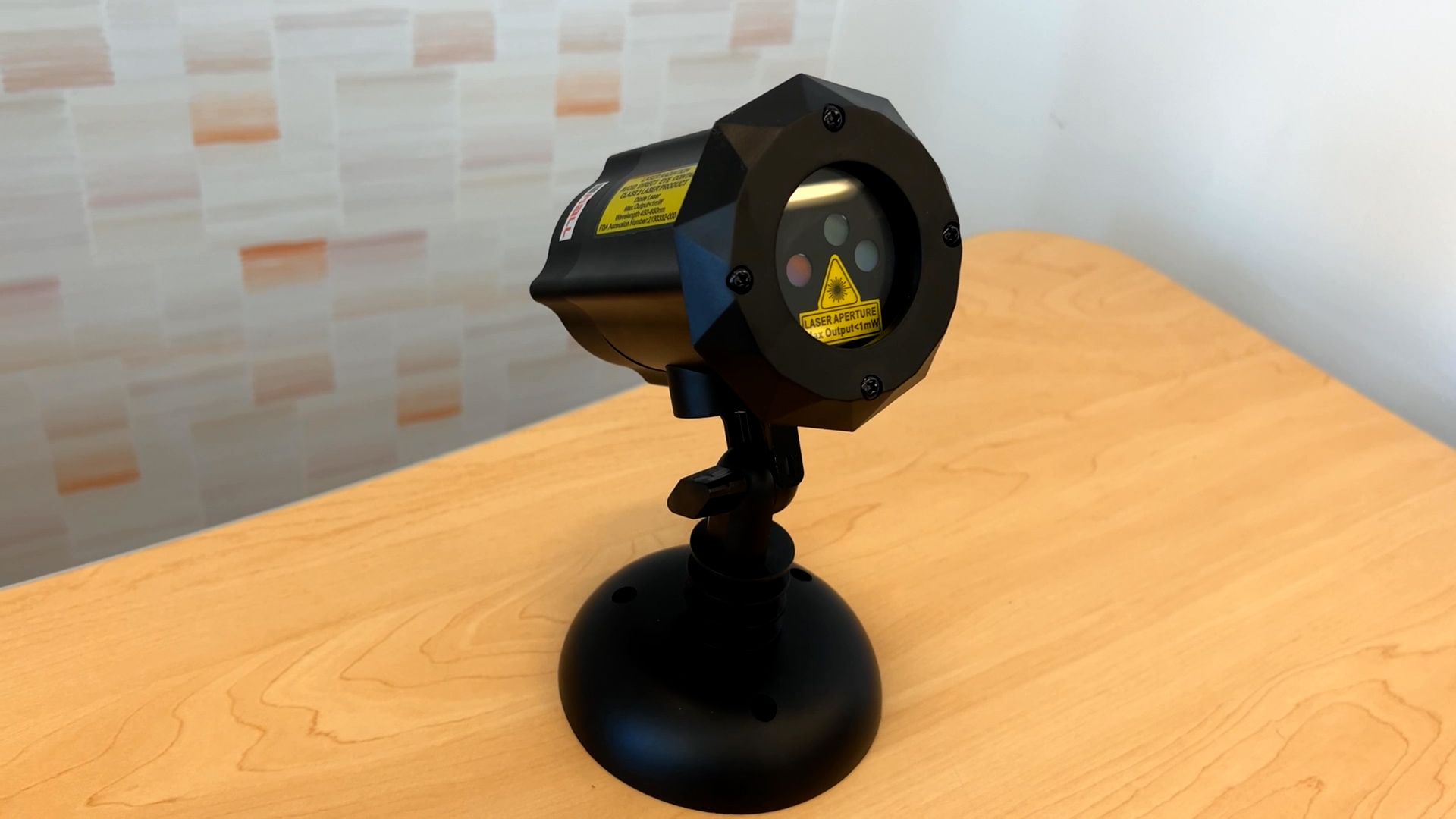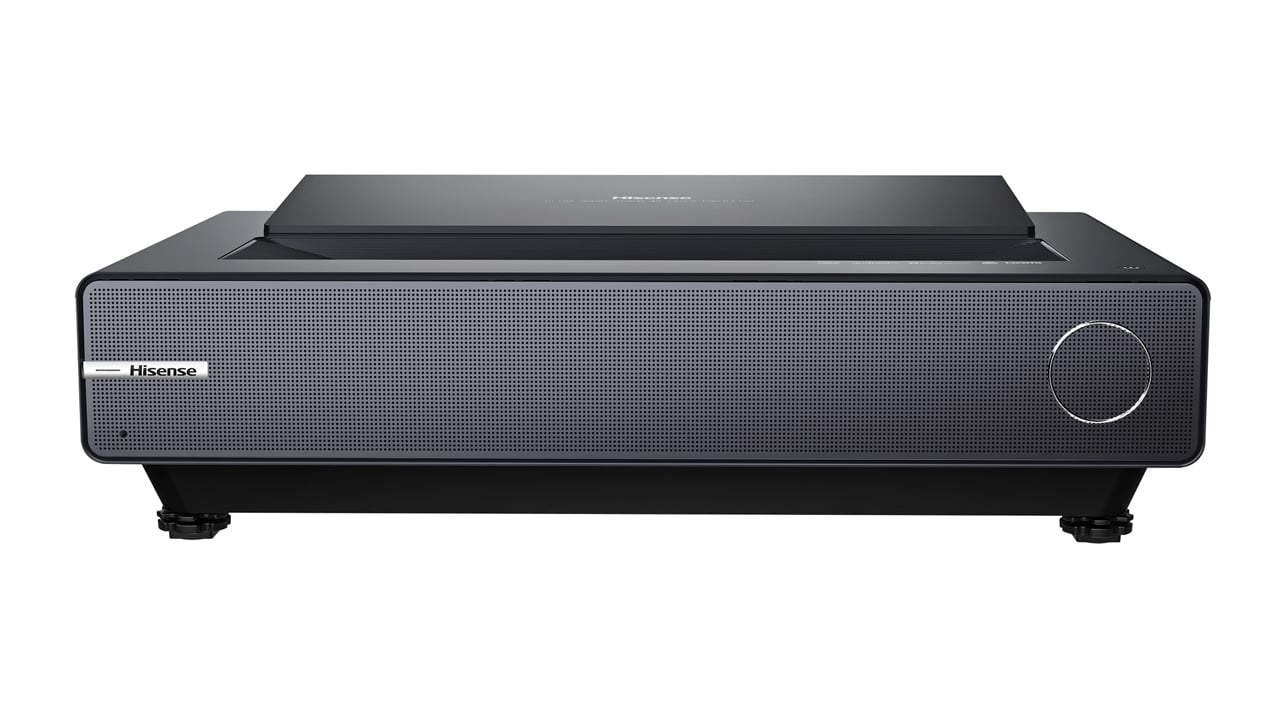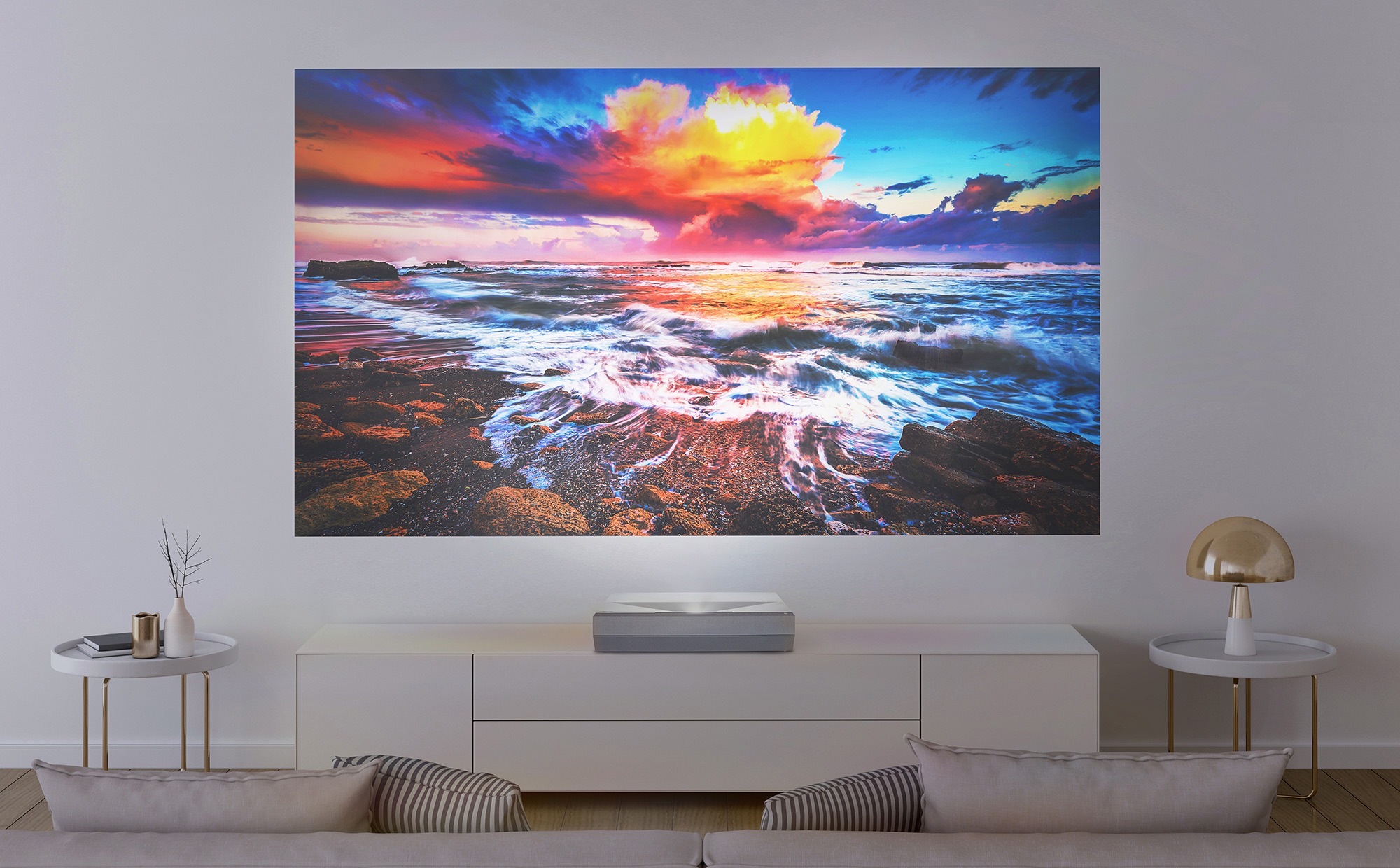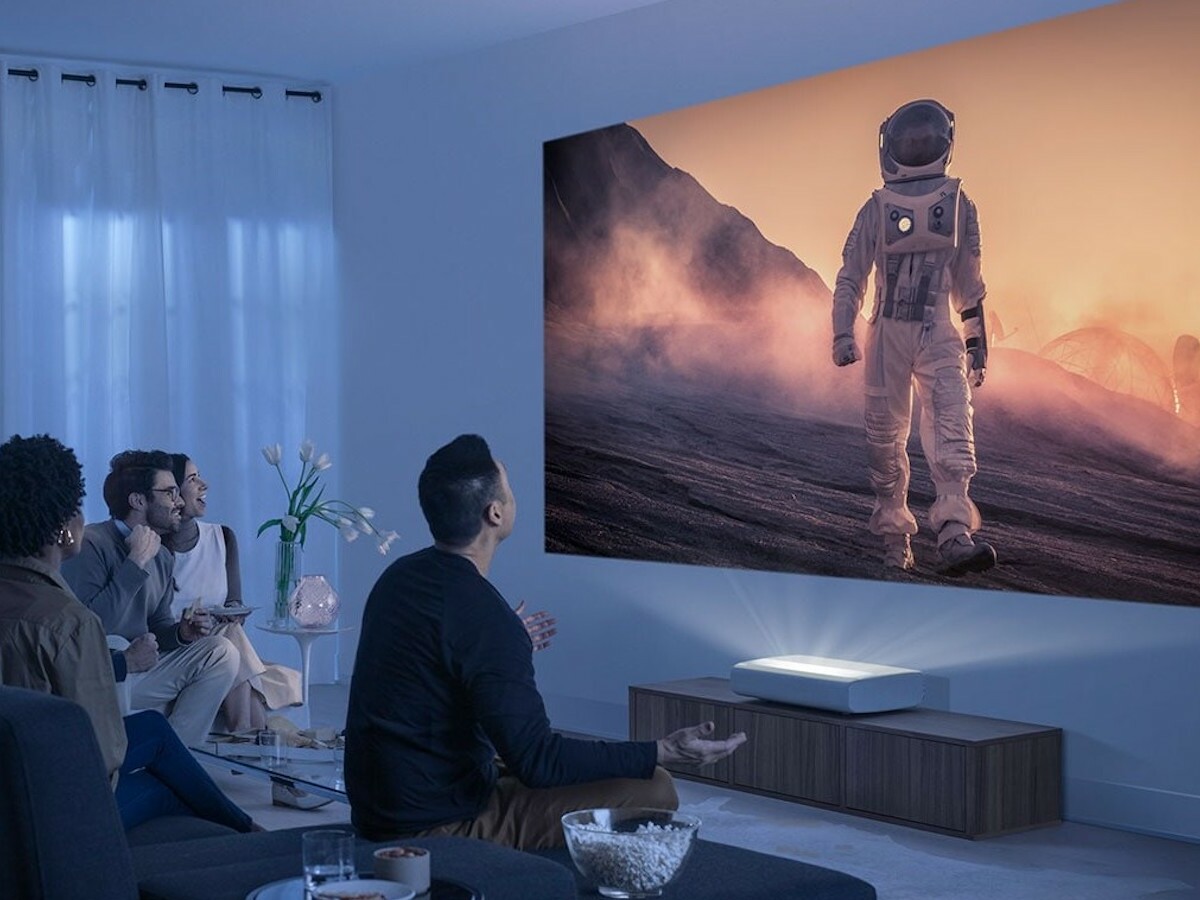Introduction
As technology continues to advance, the way we experience visual content is constantly evolving. Gone are the days of bulky and low-resolution projectors; now, we have laser projectors that offer stunning image quality and superior performance. Whether you are a business professional, a home theater enthusiast, or an educator, a laser projector can take your visual experience to the next level.
A laser projector is a cutting-edge device that utilizes laser beams to project images onto a surface. This innovative technology has revolutionized the world of projection, delivering vibrant colors, sharper details, and enhanced contrast ratios. Laser projectors are becoming increasingly popular across various industries and applications due to their numerous advantages and exceptional performance.
In this article, we will explore the fascinating world of laser projectors, uncovering how they work, their advantages over traditional projectors, applications in different settings, factors to consider when buying one, and some of the top laser projector brands available in the market today.
If you’re curious about the inner workings of laser projectors or are considering investing in one, this article will provide you with the necessary insights to make an informed decision. So, let’s dive into the world of laser projectors and discover why they are reshaping the future of projection technology.
What Is a Laser Projector?
A laser projector is a state-of-the-art device that uses laser beams to project images, videos, or presentations onto a screen or any other flat surface. Unlike traditional projectors that rely on lamps or bulbs for light source, laser projectors utilize high-intensity lasers that produce an intense and focused beam of light. This advanced technology allows laser projectors to deliver superior image quality, color accuracy, and brightness.
One of the key components of a laser projector is the laser diode, which emits the laser light. These diodes are more energy-efficient and durable compared to traditional lamps, providing a longer lifespan for the projector. Laser projectors also have precise control over the laser beams, allowing for sharper and more detailed images.
Furthermore, laser projectors offer a wide color gamut, enabling them to display a vast range of colors accurately. This results in more vibrant and lifelike visuals, making the viewing experience more immersive and enjoyable. The laser beam can be focused and directed with exceptional precision, ensuring that the projected image remains sharp and clear, even on larger screens.
Another significant advantage of laser projectors is their ability to produce high levels of brightness. With laser technology, projectors can achieve much higher brightness levels compared to traditional lamp-based projectors. This makes laser projectors ideal for large venues, outdoor events, or well-lit environments where maintaining image visibility is crucial.
Laser projectors also offer better contrast ratios, allowing for more accurate rendering of dark scenes and brighter highlights. This results in improved image depth and overall picture quality. The laser technology used in these projectors enables them to achieve deep blacks and bright whites, enhancing the visual experience and adding depth to the projected content.
Additionally, laser projectors have a faster startup time compared to traditional lamp-based projectors. They require minimal warm-up time, allowing users to start their presentations or movie nights without any delay. This quick startup is particularly beneficial for business professionals who need to deliver efficient and seamless presentations.
In summary, a laser projector is a cutting-edge device that utilizes laser beams to project high-quality images and videos. With their superior image quality, color accuracy, brightness, and long lifespan, laser projectors have become the go-to choice for many professionals and consumers alike. In the next section, we will delve into the inner workings of laser projectors and explore how they create stunning visuals.
How Does a Laser Projector Work?
Understanding how a laser projector works requires a closer look at the components and technology behind it. Unlike traditional projectors that use lamps or bulbs to produce light, laser projectors utilize laser diodes as their light source.
The laser diodes emit a highly concentrated beam of light that passes through a series of mirrors, lenses, and color filters. These optical components help to shape, control, and colorize the laser beam before it is projected onto the screen or surface.
One of the key advantages of laser projectors is their ability to generate vibrant and accurate colors. To achieve this, most laser projectors utilize three primary colors: red, green, and blue. These colors are individually produced by separate laser diodes and then combined to create a full-color image.
The laser beams are directed onto a DLP (Digital Light Processing) chip or an LCD (Liquid Crystal Display) panel. The DLP chip or LCD panel acts as the image modulator, controlling the intensity and color of the light that gets projected onto the screen.
In the case of DLP projectors, the DLP chip contains thousands of tiny mirrors that tilt towards or away from the light source. This modulation of the mirrors creates the desired pixel brightness and color, resulting in the image being projected onto the screen.
For LCD projectors, the LCD panel acts as a light valve, selectively allowing light to pass through or be blocked by the liquid crystals. By applying an electric charge, the liquid crystals twist to control the amount of light passing through each pixel. This modulation of the light creates the image displayed on the screen.
Once the image has been modulated, the laser beam is then directed through a lens system that focuses and enlarges the image. The lens system ensures that the image remains sharp and clear, even when projected onto larger screens or in a large venue.
Furthermore, laser projectors offer the flexibility of adjusting the focus, zoom, and keystone correction to adapt to different screen sizes and projection distances. This allows users to customize the projected image to suit their specific needs.
In terms of brightness and contrast, laser projectors have the advantage of producing high levels of brightness, thanks to the intense laser beams. Additionally, with their ability to modulate the light intensity precisely, laser projectors can achieve excellent contrast ratios, resulting in deep blacks and bright whites.
Overall, the combination of laser diodes, optical components, and image modulation technology enables laser projectors to produce stunning visuals with high color accuracy, brightness, and contrast. In the next section, we will explore the advantages of laser projectors over traditional projectors.
Advantages of Laser Projectors
Laser projectors offer numerous advantages over traditional projectors, making them a sought-after choice for both professional and personal use. Let’s explore some of the key benefits of laser projectors:
- Superior Image Quality: Laser projectors deliver exceptional image quality with vibrant colors, sharp details, and excellent contrast ratios. The use of laser beams ensures that the projected image remains clear and crisp, even on larger screens.
- Extended Lifespan: Laser diodes used in laser projectors have a longer lifespan compared to traditional projector lamps. They are more durable and require less frequent replacements, resulting in cost savings in the long run.
- Increased Brightness: Laser projectors can achieve higher levels of brightness compared to traditional lamp-based projectors. This makes them ideal for large venues or environments with high ambient light, where maintaining image visibility is crucial.
- Enhanced Color Accuracy: Laser projectors have a wider color gamut and produce more accurate colors compared to traditional projectors. This results in more vibrant and lifelike visuals, enhancing the overall viewing experience.
- Quick Startup: Laser projectors have a shorter warm-up time compared to traditional lamp-based projectors. They can be ready to use almost instantly, allowing for efficient and seamless presentations or movie nights.
- Energy Efficiency: Laser projectors are more energy-efficient compared to lamp-based projectors. The laser diodes consume less power while delivering higher brightness, resulting in lower energy costs and reduced environmental impact.
- Low Maintenance: Laser projectors require minimal maintenance due to their long lifespan and lack of lamp replacements. This translates to reduced downtime and lower maintenance costs.
- Flexible Installation: Laser projectors offer flexibility in installation options. They can be mounted on a ceiling or placed on a table, and they provide adjustable focus, zoom, and keystone correction to accommodate different projection distances and screen sizes.
- Quiet Operation: Compared to traditional projectors that often produce fan noise due to the cooling system required for the lamps, laser projectors operate quietly. This ensures a distraction-free environment during presentations or movie screenings.
With their exceptional image quality, extended lifespan, increased brightness, and various other advantages, laser projectors have established themselves as the future of projection technology. In the next section, we will explore the differences between laser projectors and traditional projectors.
Differences between Laser Projectors and Traditional Projectors
Laser projectors and traditional projectors differ in several key aspects, including their light source, image quality, lifespan, and maintenance requirements. Let’s explore the main differences between the two:
- Light Source: The most significant difference lies in the light source. Traditional projectors use lamps or bulbs to produce light, while laser projectors utilize laser diodes. The laser diodes in laser projectors offer better color accuracy, higher brightness, and longer lifespan compared to the lamps used in traditional projectors.
- Image Quality: Laser projectors generally deliver superior image quality compared to traditional projectors. The laser beams in laser projectors produce sharper details, better contrast ratios, and more vibrant colors, resulting in a more immersive viewing experience.
- Lifespan: Laser projectors have a longer lifespan compared to traditional projectors. The laser diodes used in laser projectors are more durable and can last for tens of thousands of hours, whereas traditional projector lamps typically have a lifespan of a few thousand hours.
- Maintenance: Laser projectors require less maintenance compared to traditional projectors. Traditional projectors often require frequent lamp replacements, while laser projectors have minimal maintenance needs due to the longer lifespan of their laser diodes. This saves both time and money in the long run.
- Energy Efficiency: Laser projectors are more energy-efficient compared to traditional projectors. The laser diodes consume less power while producing higher brightness levels, resulting in lower energy costs and reduced environmental impact.
- Startup Time: Laser projectors have a quicker startup time compared to traditional projectors. They require little to no warm-up time, allowing users to start their presentations or movie screenings immediately. Traditional projectors often require a few minutes to warm up before projecting a clear image.
- Flexibility: Laser projectors offer more flexibility in terms of installation options. They can be mounted on a ceiling or placed on a table, and they provide adjustable focus, zoom, and keystone correction to accommodate different projection distances and screen sizes. Traditional projectors may have some adjustability, but they are typically more limited in terms of installation options.
- Noise: Laser projectors operate more quietly compared to traditional projectors. Traditional projectors often produce fan noise due to the cooling system required for the lamps, while laser projectors operate silently, creating a more comfortable viewing environment.
- Cost: While laser projectors may have a higher upfront cost compared to traditional projectors, they offer long-term cost savings. With their extended lifespan, lower maintenance requirements, and energy efficiency, laser projectors prove to be a more cost-effective choice over time.
These differences highlight the advantages of laser projectors over traditional projectors in terms of image quality, lifespan, maintenance, energy efficiency, and flexibility. In the next section, we will explore some of the common applications of laser projectors.
Applications of Laser Projectors
Laser projectors are versatile devices that find applications in a wide range of settings and industries. Their superior image quality, high brightness, and long lifespan make them a popular choice for various purposes. Let’s explore some of the common applications of laser projectors:
- Business Presentations: Laser projectors are widely used in business settings for presentations, conferences, and meetings. With their sharp image quality and high brightness, laser projectors ensure that text and graphics are easily visible, even in well-lit rooms. The ability to project large, clear images makes laser projectors an excellent choice for sharing information with a large audience.
- Education: Laser projectors are increasingly utilized in classrooms and educational institutions. They enhance the learning experience by providing clear visuals for educational content such as presentations, videos, and interactive lessons. Laser projectors can be easily integrated with interactive whiteboards or other interactive learning tools, creating an engaging and immersive environment for students.
- Home Theater: Laser projectors have gained popularity among home theater enthusiasts. They offer cinema-quality visuals with vibrant colors, deep blacks, and exceptional detail. Laser projectors can transform any room into a personal movie theater, providing a larger-than-life viewing experience for film enthusiasts and avid gamers.
- Digital Signage: Laser projectors are ideal for digital signage applications, such as advertising displays in shopping malls, airports, and retail stores. They can project images or videos with vivid colors and high brightness, capturing the attention of passersby and delivering impactful advertising messages.
- Museums and Art Galleries: Laser projectors are commonly used to showcase art and exhibits in museums and galleries. Their ability to reproduce true-to-life colors and sharp details ensures that viewers can appreciate the artwork in all its intricacy and beauty. Laser projectors also allow for flexibility in projection size and placement, enabling curators to create immersive and visually stunning displays.
- Entertainment Venues: Laser projectors are favored in entertainment venues, such as theaters, concert halls, and stadiums. They can project high-quality visuals on large screens or surfaces, ensuring that audiences have an immersive and captivating experience. The high brightness of laser projectors makes them suitable for outdoor events as well.
- Simulation and Training: Laser projectors are utilized in simulation systems for training purposes in fields such as aviation, military, and healthcare. They can project realistic and detailed scenarios, enhancing the effectiveness of training programs. Laser projectors enable trainees to have a lifelike experience that closely replicates real-world situations.
- Planetariums and Observatories: Laser projectors are commonly used in planetariums and observatories to create realistic and immersive astronomical experiences. They can project accurate celestial maps, starry skies, and astronomical visuals with stunning precision, allowing visitors to explore the wonders of the universe.
The applications of laser projectors are vast and continue to expand as technology advances. Their versatility, superior image quality, and adaptability to different environments make them a valuable tool across various industries and settings. In the next section, we will discuss some factors to consider when buying a laser projector.
Factors to Consider When Buying a Laser Projector
When it comes to purchasing a laser projector, there are several important factors to consider to ensure you make the right choice for your needs. Here are some key factors to keep in mind:
- Display Technology: Different laser projectors use different display technologies, such as DLP (Digital Light Processing) or LCD (Liquid Crystal Display). Each technology has its advantages and limitations, so it’s essential to understand which one best suits your requirements.
- Brightness and Contrast: Look for a laser projector that offers sufficient brightness for your intended use. Consider the ambient lighting conditions of the projection environment. A higher brightness level is preferable for well-lit spaces. Additionally, check the contrast ratio to ensure the projector can deliver deep blacks and bright whites for optimal image quality.
- Resolution: The resolution of a laser projector determines the clarity and level of detail in the projected image. Choose a resolution that matches your content and the size of the screen. Higher resolutions, such as Full HD (1920×1080) or 4K Ultra HD (3840×2160), provide sharper visuals and are preferable for large screens or detailed presentations.
- Throw Ratio: The throw ratio determines the distance between the projector and the screen required to achieve a specific image size. Consider the available space and the desired projection size to ensure that the projector can be positioned in the optimal location.
- Connectivity Options: Evaluate the connectivity options provided by the laser projector. Look for HDMI, VGA, USB, and wireless connectivity options to ensure compatibility with your devices and enable seamless content sharing.
- Installation Flexibility: Consider the installation options offered by the laser projector. Check for features like vertical and horizontal lens shift, keystone correction, and zoom capabilities. These features allow for flexibility in projector placement and image adjustment, making installation easier and more convenient.
- Longevity and Reliability: Assess the expected lifespan of the laser projector and the reliability of its components. Look for reputable brands known for manufacturing high-quality projectors with reliable performance. Additionally, consider the warranty and customer support offered by the manufacturer.
- Price and Budget: Set a budget for your purchase and take into account the features, specifications, and quality you expect from the laser projector. Compare prices from different brands and models to find the best balance between performance and affordability.
- User Reviews and Ratings: Before making a final decision, read consumer reviews and ratings for the laser projector you are considering. User feedback can provide valuable insights into the actual performance, reliability, and user experience of the projector.
Considering these factors and conducting thorough research will help you make an informed decision when buying a laser projector. Assess your specific requirements and prioritize the features that are most important to you. With the right laser projector, you can enjoy stunning visuals and an immersive viewing experience in your desired setting.
Top Laser Projector Brands
When it comes to investing in a laser projector, choosing a reliable and reputable brand is crucial to ensure quality, performance, and long-term satisfaction. Here are some of the top laser projector brands known for their exceptional products:
- Epson: Epson is a well-established brand that offers a wide range of laser projectors for various applications. Known for their bright and vivid image quality, Epson projectors incorporate innovative technologies to deliver superior performance and reliability.
- Sony: Sony is a renowned brand in the electronics industry, and their laser projectors are highly regarded for their cutting-edge features and exceptional image quality. Sony projectors often incorporate advanced technologies, such as 4K resolution and HDR (High Dynamic Range) support, delivering stunning visuals.
- BenQ: BenQ is a popular choice for laser projectors, offering a diverse lineup tailored for home theater, business, and education applications. BenQ projectors are known for their excellent color accuracy, brightness, and user-friendly features.
- Optoma: Optoma is a leading brand in the projector market, known for their high-performance laser projectors. With a wide range of models, Optoma offers versatile projectors that excel in image quality, brightness, and flexible installation options.
- LG: LG is a recognizable brand in the consumer electronics industry, and their laser projectors combine innovative design with cutting-edge technology. LG projectors offer impressive image quality, smart features, and sleek designs, making them an attractive choice for home entertainment setups.
- NEC: NEC is a trusted brand for professional-grade laser projectors. Designed for commercial applications, NEC projectors offer high brightness, advanced connectivity options, and robust reliability, making them suitable for large venues and business installations.
- Casio: Casio is known for their innovative laser and LED hybrid projectors. These projectors offer long-lasting light sources, low maintenance requirements, and energy efficiency. Casio projectors are popular in education settings and provide reliable performance.
- ViewSonic: ViewSonic offers a range of laser projectors that cater to both professional and home entertainment needs. Their projectors are known for their excellent image quality and flexible connectivity options, making them a popular choice for various applications.
These are just a few of the top laser projector brands in the market, each offering unique features and advantages. When selecting a brand, it is essential to consider your specific requirements, budget, and the reputation of the manufacturer. Researching and reading customer reviews can provide valuable insights into the performance and reliability of the projector models offered by these brands.
Ultimately, choosing a reputable brand ensures you get a high-quality laser projector that meets your expectations and delivers an outstanding visual experience.
Conclusion
Laser projectors have transformed the way we experience visual content, offering superior image quality, brightness, and longevity compared to traditional projectors. With their advanced laser diode technology and innovative features, laser projectors have become increasingly popular across various industries and applications.
In this article, we explored the concept of laser projectors, delving into how they work, their advantages over traditional projectors, applications in different settings, factors to consider when buying one, and some of the top laser projector brands available in the market today.
We learned that laser projectors utilize laser beams to deliver stunning visuals with vibrant colors, sharp details, and excellent contrast ratios. They offer numerous advantages, such as extended lifespan, higher brightness, energy efficiency, and low maintenance requirements. Laser projectors find applications in business presentations, education, home theater setups, digital signage, museums, entertainment venues, simulation and training, and more.
When purchasing a laser projector, it is important to consider factors such as display technology, brightness and contrast, resolution, throw ratio, connectivity options, installation flexibility, longevity, and reliability. Additionally, choosing from reputable brands like Epson, Sony, BenQ, Optoma, LG, NEC, Casio, and ViewSonic ensures you get a high-quality projector that meets your specific requirements.
By understanding the inner workings of laser projectors and considering the various aspects involved in buying one, you can make an informed decision and enjoy the benefits of superior image quality and immersive visual experiences.
Whether you are a business professional looking to deliver impactful presentations, a teacher aiming to enhance classroom learning, or a home theater enthusiast craving a cinematic experience, a laser projector can take your visual experience to new heights.







